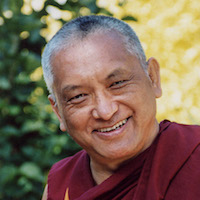
*Excerpted from How to Practice Dharma, by Kyabje Lama Zopa Rinpoche.
~
In my opinion, practicing dharma is the best way—the only way—to really take care of ourselves.
His Holiness the Dalai Lama often says that if we want to be selfish we should be wisely selfish.
This means if we want happiness, then we should never harm others and always benefit them, finding the best ways to serve them. In other words, the best way to take care of ourselves is to fully dedicate ourselves to the welfare of others.
Practicing dharma in this way has an element of selfishness in it. Along with our wish for happiness in future lives, liberation from samsara, and full enlightenment, we wish for the happiness of this life. It’s here in our heart, even as we do service for others. Because of our delusions, our motivation is not completely cleansed of attachment. But even if we can’t find full satisfaction in our life because of this attachment, we’re still performing positive actions and being useful to others. Therefore there’s no reason to stop helping others even if our motivation is impure, and we’re still full of delusions.
If we were to wait until we had a completely pure motivation before we tried to do positive things, we’d probably never do anything beneficial. Even with mixed motivation, it’s still good to help others. Not benefitting others because we don’t yet have a pure motivation is crazy. It would mean that instead of doing positive actions, we’d be completely wasting every action we did. Every time we put energy and expense into obtaining shelter, food, medicine, and clothes is completely wasted if we didn’t benefit others. We won’t benefit ourselves if we do not benefit others.

If we’re new to dharma, we might feel like giving up because we think it doesn’t work. We feel lonely, depressed and alienated from our friends. This actually comes from not having enough understanding of dharma. We’re applying the remedy to our delusions but not strongly enough.
We’re surrounded by people who are always trying to develop their three poisonous minds and working only for worldly concerns, while we’re trying to do the complete opposite: diminish our poisonous minds and be free from worldly concern. We might think that it’s impossible to practice dharma and live a normal life. That the only thing we can do is to physically separate ourself from this life.
However, when our mind gets a little closer to the dharma, we start to find that we have less interest in life’s happiness. We don’t need to be so involved with worldly concerns. The attitudes of the people around us affect us less. Things that go on around us—all the pride, jealousy, attachment, anger, and ill-will that we see others display—mean less to us. We find that we no longer act or think like the people around us. With less contact with such people, of course we have more time to practice dharma, but it can seem strange at first.
We can feel lonely when our old friends no longer come around.
The point is, however, that it’s not necessary to give up our job and life, but it is necessary to change our attitude. We can practice morality and charity anywhere we are. But as long as we follow the thought of the eight worldly dharmas, we can achieve liberation. The door to the path of liberation is the mind renouncing samsara. And renunciation of the happiness of this life is the first thing we need to generate in our minds.
~
Author: Lama Zopa Rinpoche

No comments:
Post a Comment